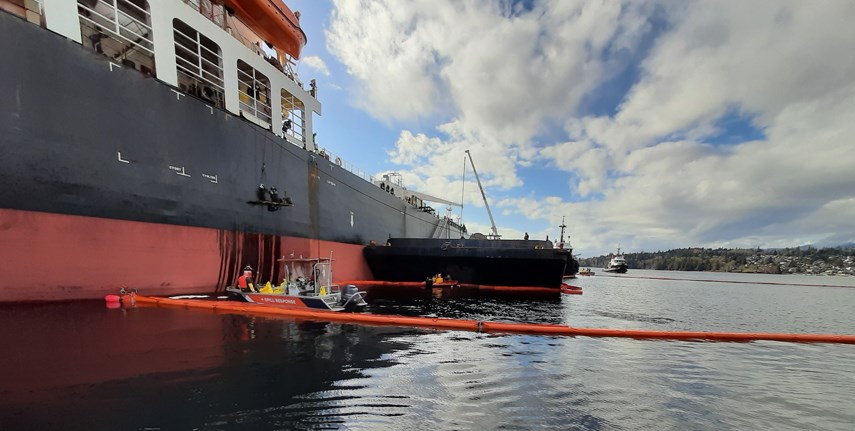Crews have cleaned up a small bunker oil spill on Burrard Inlet.
Western Canada Marine Response Corp. deployed anti-pollution vessel Texada Sentinel with a crew of four around 10:30 a.m. Monday to a ship anchorage between Cates Park/ Whey-ah-Wichen and Belcarra Regional Park where Henry Maersk, a Danish oil tanker, was refuelling.
“There was some sort of fuel burp during that operation and some fuel went onto the deck and about three litres of that got into the water,” said Michael Lowry, manager of communications for the response agency. “We got there and we put a second containment boom around the vessels and right now they're just cleaning the hull.”
As spills go, three litres is small, Lowry said, and is unlikely to result in lasting environmental damage. The 2015 MV Marathassa bunker oil spill dumped 2,700 litres into Englsih Bay and Burrard Inlet.
Transport Canada’s pollution spotting plane has done flyovers of the site. The Vancouver Fraser Port Authority’s tender Takaya is also on the scene, as are two tugs.
The spill, regardless of size, underscores the Tsleil-Waututh Nation’s continued opposition to any expansion of the Trans Mountain pipeline or tanker traffic in their territorial waters, said Charlene Aleck, spokeswoman for the nation’s Sacred Trust Initiative.
Tsleil-Waututh members recently detected herring spawning successfully in Indian Arm for the first time in years, which means killer whales can’t be far behind, Aleck said. Spills of any kind are a threat to them and other species they’ve been trying to welcome back.
“We've tried for years and years to clean up salmon-bearing creeks and clam garden beds to have that reproduction. In that delicate ecosystems, any amount of heavy oil could do irreparable damage, so it is a big concern,” she said.
More than jeopardizing the nation’s work in restoring the health of the inlet, the pollution represents a spiritual threat as well, Aleck added.
“We have a creation story. Our first grandmother came from the inlet, so it's a lifeline that runs through our blood as Tsleil-Waututh people. It's a sacred thing and it's really close to our hearts, and we really uphold that in the things that we do. A damage to her is a damage to us,” she said.
Aleck said the nation will take be taking their concerns to the federal government.




